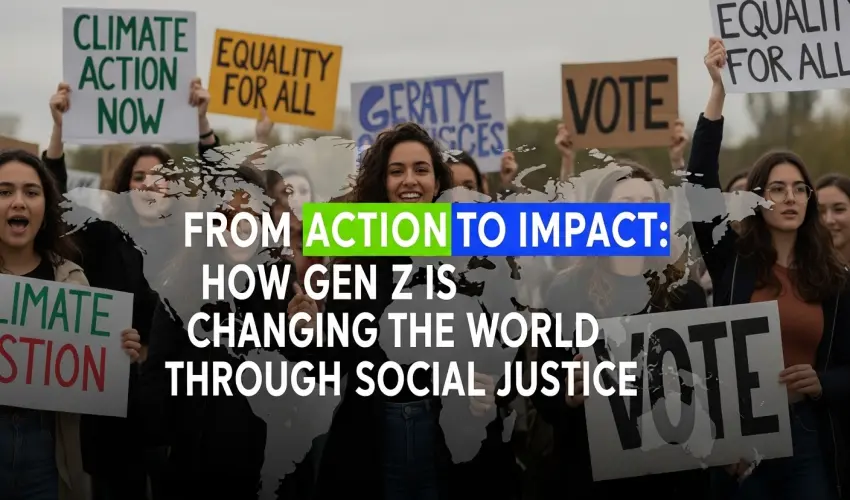From Action to Impact: How Gen Z is Changing the World Through Social Justice
Discover how Gen Z is revolutionizing social justice. Armed with digital tools and a passion for purpose, these young changemakers are leading movements for climate action, racial equality, and mental health.
Key Takeaways
-
Gen Z is a digitally fluent and socially conscious generation driving real-world change.
-
They prioritize purpose over profit, challenging brands and governments to be more ethical.
-
Their core issues include mental health, climate justice, racial equality, and LGBTQ+ rights.
-
Their activism is intersectional, inclusive, and rooted in empathy.
-
Social media is their megaphone, and authentic storytelling is their strategy.
-
They demand transparency, accountability, and equity in all sectors.
-
Gen Z doesn’t ask for permission—they build movements from passion.
-
From protests to policy, they are creating a new generation of leadership.
-
Gen Z isn’t the future of activism—they are its present.
Introduction: The Purpose-Driven Generation
Born between the mid-1990s and early 2010s, Gen Z has earned its reputation as the most socially conscious generation to date. Armed with smartphones and fueled by passion, these young changemakers are rewriting the rulebook for activism. For them, social justice isn’t an extracurricular activity—it’s a way of life.
They are digital natives, global thinkers, and relentless in their pursuit of a better world. Let's explore how Gen Z isn’t just talking about change—they are the change.
A Generation Forged in Crisis
From economic recessions and a worsening climate crisis to racial inequities and a global pandemic, Gen Z has come of age in an era of perpetual instability. But rather than retreat from the chaos, they’ve turned it into a rallying cry. Having grown up watching the failures of traditional systems, they are determined to do things differently.
Instead of waiting for leadership, Gen Z is the leadership.
The Digital Battlefield: Social Media as a Tool for Revolution
While past generations relied on marches and petitions, Gen Z has Instagram Stories, TikTok videos, and Twitter threads. For them, social media is more than a tool—it’s a platform for revolution.
Movements like #BlackLivesMatter, #FridaysForFuture, #StopAsianHate, and #MeToo gained unprecedented momentum thanks to Gen Z’s ability to amplify issues globally in minutes. Viral videos, infographic carousels, and call-out culture ensure that injustice no longer goes unseen. Behind these viral trends are organized young activists coordinating protests, designing educational toolkits, and launching fundraisers with unmatched speed and reach.
From Passion Projects to Global Platforms
Gen Z is translating passion into tangible action. Many of their world-changing projects start at school desks or in bedrooms—but they don’t stay there for long.
-
Khloe Thompson (U.S.): At age nine, she launched Khloe Kares, creating and distributing care packages for homeless women in her community.
-
Disha Ravi (India): As a key member of Greta Thunberg’s Fridays For Future, this climate activist has been instrumental in mobilizing youth across South Asia.
-
Jerome Foster II (USA): At 18, he became the youngest-ever White House Advisor, focusing on climate justice and equity under the Biden administration.
-
Amika George (UK): She launched the #FreePeriods campaign to end period poverty, successfully influencing national policy to provide free sanitary products in schools.
Authenticity and Intersectionality: The New Standard
Gen Z demands genuineness—from themselves, their peers, and the institutions they support. This generation is allergic to performative activism and empty brand statements. They expect honesty, transparency, and a real commitment to change.
Their activism is also deeply interconnected. Gen Z understands that social issues overlap: climate justice is racial justice, gender equity includes disability rights, and economic reform must respect indigenous sovereignty. This intersectional approach makes their movements more expansive, inclusive, and powerful.
Championing the Mental Health Movement
Unlike previous generations, Gen Z speaks openly and unapologetically about mental health. They are actively dismantling stigma and demanding better resources, understanding, and compassion from schools, workplaces, and governments.
For Gen Z, mental health isn't an afterthought; it’s central to their activism. They see self-care as an act of resistance and have normalized conversations around burnout and emotional well-being through hashtags like #MentalHealthMatters and peer-led support groups.
Redefining Success: Careers with a Conscience
Gen Z is not satisfied with traditional metrics of success. They seek careers that align with their values, often turning down lucrative jobs to work for non-profits, mission-driven startups, or their own social enterprises.
Platforms like LinkedIn are filled with Gen Z users whose titles read “Climate Justice Advocate,” “Equity Educator,” or “Queer Tech Founder.” These aren’t side hustles; they are careers built around causes. For this generation, profit without purpose is meaningless.
Conclusion: The Generation That Refuses to Quit
Gen Z is not the generation of the future. They are the architects of today. Fueled by passion and guided by purpose, they are redefining leadership, advocacy, and what it means to live a meaningful life.
They’re not just posting—they’re protesting, creating, innovating, and healing. They challenge the status quo not for attention, but for transformation. And in the face of crisis, they do not retreat—they rise. To watch Gen Z is to witness a movement in motion. And it's only the beginning.
Join the conversation
Share how this story resonates with your journey. We feature standout reflections in our newsletter.

